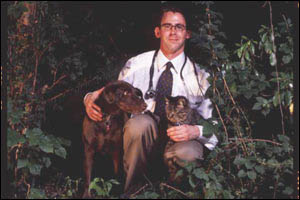| Urban Strategist |
|
|||
| Endoscopy/Ultrasonography | |||
Robert B. Justin Internist Ultravet Diagnostics 220 East Jericho Turnpike Mineola, New York (800-486-3246) "Everything that walks through our doors is sick and needs help, and very few have textbook medical conditions," Robert Justin says of his referral-only practice. Animals are usually referred to him for ultrasounds or endoscopic or laparoscopic procedures after simpler diagnostics have failed. Ultravet is a 24-hour clinic that works with about 100 practices in the New York region. Justin typically travels -- with his state-of-the-art equipment -- to nine or ten different offices a week. In vet school at Cornell, Justin -- a bearded, skinny science-fair type who grew up in the Bronx with pet lizards and snakes instead of puppies -- decided he'd rather be a veterinary sleuth than a veterinary surgeon. "By the time a surgeon gets a patient," he says, "the problem's already known." In his specialty, however, "when you do a probe on an abdomen or heart, you hold your breath a second to see what you find. It can be disturbing. But that's also what keeps it interesting."
|
|||
| Exotics | |||
| Sally Haddock Internist St. Marks Veterinary Hospital 348 East 9th Street (212-477-2688; www.stmarksvet.com) When Sally Haddock was applying to vet schools in the seventies, women were the exotics. Now things have improved vastly -- women make up about 75 percent of vet students -- and Haddock has become an expert at exotics, particularly the avian kind. "Birds have great personality," says the spirited blonde author of The Making of a Woman Vet. "They're very curious." Injuries, viral infections, and gastroenteritis are the most common bird ills, but Haddock also deals with obsessive feather-picking, bad diets ("Birds are seed junkies," she says), and "way too many cat bites." Because blood loss is a major issue with surgery on tiny bird parts, St. Marks, with its laser-surgery machine, is the place in the city for avian operations. Other exotics that visit the clinic include bearded dragons, potbellied pigs, hedgehogs, ferrets, snakes, and hairy chinchillas ("the cutest things in the whole wide world," says the vet). Soon, after renovations, St. Marks hopes to accommodate fish. "If we have to hospitalize fish," she says, "it would be handy to have an aquarium." Laurie Hess "Effectively, someone kissed the monkey, gave it herpes, and killed it," Hess says. Herpes simplex, so common in humans, is fatal to simians. Since then, Hess and the three other staff doctors in the AMC's exotics department have treated an average of 3,000 animals each year -- not counting emergencies. She recently doctored Izzy, a male guinea pig with breast cancer who made it through a double mastectomy only to contract an unrelated lymphoma. Izzy's owner was willing to do anything to save him, so Hess e-mailed other exotics specialists and oncologists to find a way to give the animal chemotherapy, something the AMC had never done for a guinea pig. Poor Izzy survived one round of chemo but later died. |
|||
How Sammy Got His Meow Back... In 1997, Sammy was retrieved from an abandoned building in Chinatown by City Critters animal-rescue service and taken to West Chelsea Veterinary Hospital. He had difficulty breathing and was unable to meow. Read Sammy's story >>> |
|||
|
|
|||
| Oncology | |||
| Gerald Post Board-certified oncologist Long Island Veterinary Specialists 163 South Service Road Plainview, New York (516-501-1700; www.livs.org) When he's not helping local zookeepers deal with afflicted wildlife, the benevolent and bearded Gerald Post, 40, is trying to cure dogs and cats of cancer. His practice offers the most advanced in vet oncology: CT scans, chemotherapy, and some experimental protocols like biological immunotherapy and vaccine therapy. Cancer in animals seems to be on the rise, says Post, but "it's pretty rewarding to see the progress. The therapies we're using now are similar to those used with people." Post, who founded the national Animal Cancer Foundation in 1999, disputes the notion that veterinary oncology is grim work. "These are animals who, without intervention, will die. Even if we help, they might still die, but at least we can increase their survival time and quality of life. My patients are happy." Tim Rocha Since beginning his practice in 1994, Rocha has cared for mostly middle-age to older pets, many with lymphoma or mast-cell tumors. So this is a vet who's sensitive to animals that are likely to have other ailments that might affect their response to chemo or slow the healing process. |
|||
| Respiratory/Gastrointestinal | |||
| John Broussard Internist Animal Medical Center 510 East 62nd Street (212-838-8100, ext. 8723; www.amcny.org) "Things that are strange to general vets become pretty run-of-the-mill here," says John Broussard, the 38-year-old Texan who heads the AMC's gastrointestinal- and respiratory-disease departments. "There are very few places in the world where you can put together a collection of, say, feline and canine gastro cases that reach numbers in the thousands. So a lot of knowledge can be generated quickly here; we optimize the diagnostics and treatments." About twenty of these gastrointestinal or respiratory cases a week come from veterinary referrals. "A lot of animals are directed here because they need an intervention: They won't eat or have been vomiting and need tube feeding." Broussard and his team of interns and residents also work on clinical studies, which include testing drugs that are just becoming available for liver and intestinal problems (such as inflammatory bowel disease). "We're like the last step in the stamp-of-approval process," he says. |
|||
